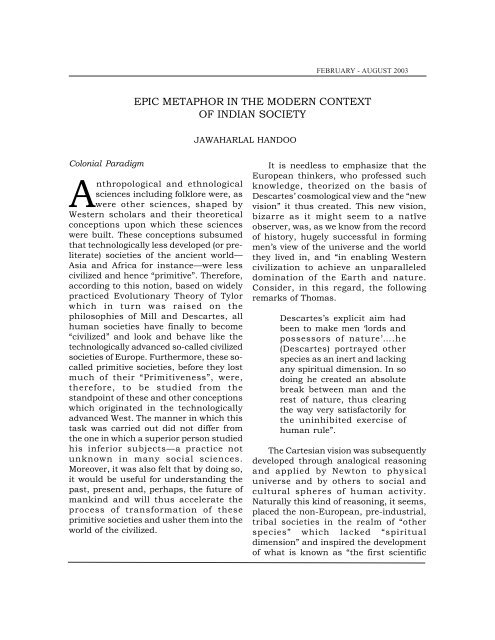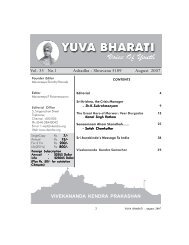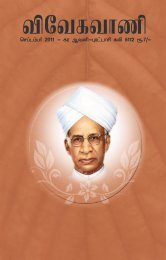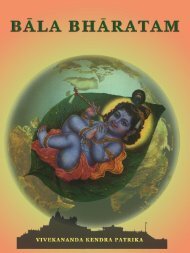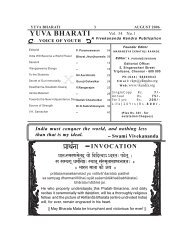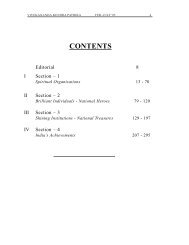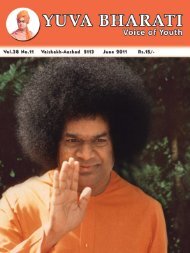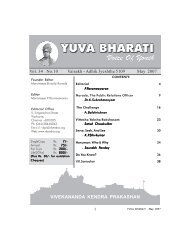Epics in Imprints-1.pdf - Vivekananda Kendra Prakashan
Epics in Imprints-1.pdf - Vivekananda Kendra Prakashan
Epics in Imprints-1.pdf - Vivekananda Kendra Prakashan
You also want an ePaper? Increase the reach of your titles
YUMPU automatically turns print PDFs into web optimized ePapers that Google loves.
Colonial Paradigm<br />
FEBRUARY - AUGUST 2003<br />
EPIC METAPHOR IN THE MODERN CONTEXT<br />
OF INDIAN SOCIETY<br />
Anthropological and ethnological<br />
sciences <strong>in</strong>clud<strong>in</strong>g folklore were, as<br />
were other sciences, shaped by<br />
Western scholars and their theoretical<br />
conceptions upon which these sciences<br />
were built. These conceptions subsumed<br />
that technologically less developed (or preliterate)<br />
societies of the ancient world—<br />
Asia and Africa for <strong>in</strong>stance—were less<br />
civilized and hence “primitive”. Therefore,<br />
accord<strong>in</strong>g to this notion, based on widely<br />
practiced Evolutionary Theory of Tylor<br />
which <strong>in</strong> turn was raised on the<br />
philosophies of Mill and Descartes, all<br />
human societies have f<strong>in</strong>ally to become<br />
“civilized” and look and behave like the<br />
technologically advanced so-called civilized<br />
societies of Europe. Furthermore, these socalled<br />
primitive societies, before they lost<br />
much of their “Primitiveness”, were,<br />
therefore, to be studied from the<br />
standpo<strong>in</strong>t of these and other conceptions<br />
which orig<strong>in</strong>ated <strong>in</strong> the technologically<br />
advanced West. The manner <strong>in</strong> which this<br />
task was carried out did not differ from<br />
the one <strong>in</strong> which a superior person studied<br />
his <strong>in</strong>ferior subjects—a practice not<br />
unknown <strong>in</strong> many social sciences.<br />
Moreover, it was also felt that by do<strong>in</strong>g so,<br />
it would be useful for understand<strong>in</strong>g the<br />
past, present and, perhaps, the future of<br />
mank<strong>in</strong>d and will thus accelerate the<br />
process of transformation of these<br />
primitive societies and usher them <strong>in</strong>to the<br />
world of the civilized.<br />
JAWAHARLAL HANDOO<br />
It is needless to emphasize that the<br />
European th<strong>in</strong>kers, who professed such<br />
knowledge, theorized on the basis of<br />
Descartes’ cosmological view and the “new<br />
vision” it thus created. This new vision,<br />
bizarre as it might seem to a natïve<br />
observer, was, as we know from the record<br />
of history, hugely successful <strong>in</strong> form<strong>in</strong>g<br />
men’s view of the universe and the world<br />
they lived <strong>in</strong>, and “<strong>in</strong> enabl<strong>in</strong>g Western<br />
civilization to achieve an unparalleled<br />
dom<strong>in</strong>ation of the Earth and nature.<br />
Consider, <strong>in</strong> this regard, the follow<strong>in</strong>g<br />
remarks of Thomas.<br />
Descartes’s explicit aim had<br />
been to make men ‘lords and<br />
possessors of nature’….he<br />
(Descartes) portrayed other<br />
species as an <strong>in</strong>ert and lack<strong>in</strong>g<br />
any spiritual dimension. In so<br />
do<strong>in</strong>g he created an absolute<br />
break between man and the<br />
rest of nature, thus clear<strong>in</strong>g<br />
the way very satisfactorily for<br />
the un<strong>in</strong>hibited exercise of<br />
human rule”.<br />
The Cartesian vision was subsequently<br />
developed through analogical reason<strong>in</strong>g<br />
and applied by Newton to physical<br />
universe and by others to social and<br />
cultural spheres of human activity.<br />
Naturally this k<strong>in</strong>d of reason<strong>in</strong>g, it seems,<br />
placed the non-European, pre-<strong>in</strong>dustrial,<br />
tribal societies <strong>in</strong> the realm of “other<br />
species” which lacked “spiritual<br />
dimension” and <strong>in</strong>spired the development<br />
of what is known as “the first scientific


